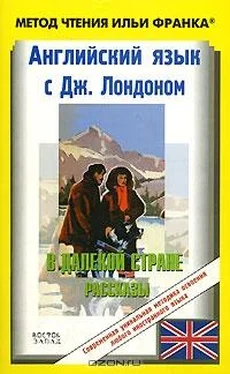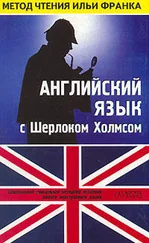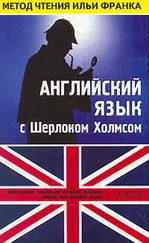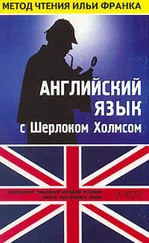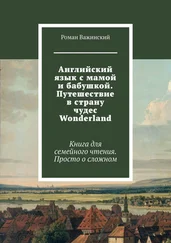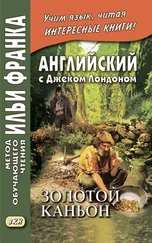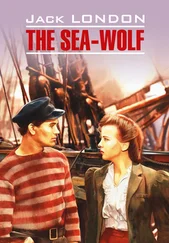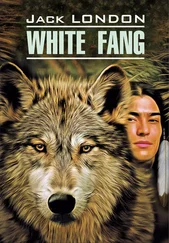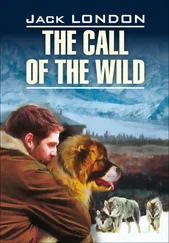"I say, Carter, I say (послушай, Картер, послушай); let's talk (давай поговорим). There’s a good chap (ты же хороший парень)."
The master of arts was thinking rapidly, now (теперь магистр искусств думал быстро), shaping a skillful flank movement on the bed (сделав ловкое боковое движение к кровати; to shape — делать по какому-либо образцу; продумывать, планировать ) where his Smith & Wesson lay (на которой лежал его «смит-вессон»; to lie — лежать ). Keeping his eyes on the madman (не сводя глаз с сумасшедшего: «сохраняя глаза на сумасшедшем»), he rolled backward on the bunk (он перекатился назад по койке), at the same time clutching the pistol (одновременно схватив пистолет; at the same time — одновременно ).
"Carter!"
retreat [rI'trJt], mouth [mauT], roll [rqul]
"I say, what 's the matter?"
The clerk dodged back, cutting off his retreat to the door, but never opening his mouth.
"I say, Carter, I say; let 's talk. There 's a good chap."
The master of arts was thinking rapidly, now, shaping a skillful flank movement on the bed where his Smith & Wesson lay. Keeping his eyes on the madman, he rolled backward on the bunk, at the same time clutching the pistol.
"Carter!"
The powder flashed full in Weatherbee's face (порох вспыхнул прямо в лицо Уэзерби), but he swung his weapon and leaped forward (но он взмахнул своим оружием и прыгнул вперед; to swing — махать, размахивать ). The axe bit deeply at the base of the spine (топор врубился глубоко в основание позвоночника; to bite — кусать; колоть, рубить /любым холодным оружием/ ), and Percy Cuthfert felt all consciousness of his lower limbs leave him (и Перси Катферт почувствовал, как его покидает всякое ощущение нижних конечностей). Then the clerk fell heavily upon him (затем клерк тяжело навалился на него; to fall — падать, валиться ), clutching him by the throat with feeble fingers (хватая его за горло ослабевшими пальцами). The sharp bite of the axe had caused Cuthfert to drop the pistol (от резкого удара топором Катферт выронил пистолет; to cause — послужить причиной/поводом для чего-либо; мотивировать что-либо ), and as his lungs panted for release (и пока его легкие страстно желали освободиться; to pant for — страстно желать, томиться, тосковать ), he fumbled aimlessly for it among the blankets (он бессмысленно нащупывал его среди одеял). Then he remembered (тогда он вспомнил). He slid a hand up the clerk's belt to the sheath-knife (он просунул руку к ремню конторщика за ножом в ножнах; to slide — скользить; всовывать, засовывать ); and they drew very close to each other in that last clinch (и они очень /тесно/ сблизились друг с другом в этом последнем объятии).
powder ['paudq], cause [kLz], release [rI'lJs]
The powder flashed full in Weatherbee's face, but he swung his weapon and leaped forward. The axe bit deeply at the base of the spine, and Percy Cuthfert felt all consciousness of his lower limbs leave him. Then the clerk fell heavily upon him, clutching him by the throat with feeble fingers. The sharp bite of the axe had caused Cuthfert to drop the pistol, and as his lungs panted for release, he fumbled aimlessly for it among the blankets. Then he remembered. He slid a hand up the clerk's belt to the sheath-knife; and they drew very close to each other in that last clinch.
Percy Cuthfert felt his strength leave him (Перси ощущал, как силы покидают его). The lower portion of his body was useless (нижняя часть его тела была недееспособна). The inert weight of Weatherbee crushed him (неподвижный вес Уэзерби придавил его), — crushed him and pinned him there like a bear under a trap (придавил его и схватил его, как медведя капкан). The cabin became filled with a familiar odor (хижина наполнилась знакомым запахом), and he knew the bread to be burning (и он понял, что подгорает хлеб). Yet what did it matter (однако, какое это имело значение)? He would never need it (он ему никогда не понадобится). And there were all of six cupfuls of sugar in the cache (и было еще целых шесть чашек сахара на складе), — if he had foreseen this (если бы он предвидел это) he would not have been so saving the last several days (он не экономил бы так последние несколько дней). Would the wind-vane ever move (двинется ли когда-нибудь флюгер)? It might even be veering now (возможно даже, что он сейчас поворачивается). Why not (почему бы и нет)? Had he not seen the sun to-day (он не видел сегодня солнце)? He would go and see (он пойдет и посмотрит). No; it was impossible to move (нет, невозможно было двинуться). He had not thought the clerk so heavy a man (он не думал, что клерк такой тяжелый мужик).
inert [I'nWt], familiar [fq'mIlIq], might [maIt]
Percy Cuthfert felt his strength leave him. The lower portion of his body was useless. The inert weight of Weatherbee crushed him, — crushed him and pinned him there like a bear under a trap. The cabin became filled with a familiar odor, and he knew the bread to be burning. Yet what did it matter? He would never need it. And there were all of six cupfuls of sugar in the cache, — if he had foreseen this he would not have been so saving the last several days. Would the wind-vane ever move? It might even be veering now. Why not? Had he not seen the sun to-day? He would go and see. No; it was impossible to move. He had not thought the clerk so heavy a man.
How quickly the cabin cooled (как быстро остывала хижина)! The fire must be out (должно быть, погас огонь). The cold was forcing in (холод втискивался вовнутрь). It must be below zero already (наверное, уже ниже нуля), and the ice creeping up the inside of the door (и лед крадется вверх по внутренней части двери). He could not see it (он не видел этого), but his past experience enabled him to gauge its progress by the cabin's temperature (но прошлый опыт позволил ему оценить его продвижение по температуре в избушке). The lower hinge must be white ere now (нижняя дверная петля должна быть уже белой; ere this/now — уже ). Would the tale of this ever reach the world (дойдет ли когда-нибудь до мира рассказ об этом)? How would his friends take it (как его воспримут его друзья)? They would read it over their coffee, most likely (они будут читать его за кофе, скорее всего; most likely — весьма правдоподобно, вероятнее всего ), and talk it over at the clubs (и обсуждать в клубах). He could see them very clearly (он видел их очень четко). "Poor old Cuthfert (бедный старина Катферт)," they murmured (шептали они); "not such a bad sort of a chap, after all (не такой уж и плохой парень, в конечном счете)." He smiled at their eulogies (он улыбнулся их панегирикам), and passed on in search of a Turkish bath (и пошел дальше в поисках турецкой бани; in search of — в поисках ).
Читать дальше
